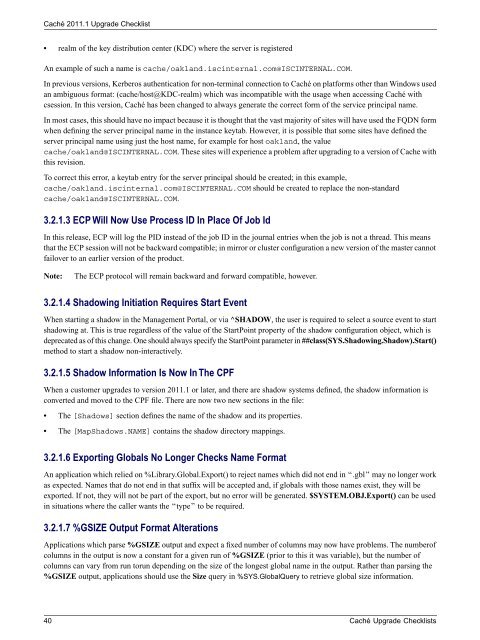Caché Upgrade Checklists - InterSystems Documentation
Caché Upgrade Checklists - InterSystems Documentation
Caché Upgrade Checklists - InterSystems Documentation
Create successful ePaper yourself
Turn your PDF publications into a flip-book with our unique Google optimized e-Paper software.
<strong>Caché</strong> 2011.1 <strong>Upgrade</strong> Checklist• realm of the key distribution center (KDC) where the server is registeredAn example of such a name is cache/oakland.iscinternal.com@ISCINTERNAL.COM.In previous versions, Kerberos authentication for non-terminal connection to <strong>Caché</strong> on platforms other than Windows usedan ambiguous format: (cache/host@KDC-realm) which was incompatible with the usage when accessing <strong>Caché</strong> withcsession. In this version, <strong>Caché</strong> has been changed to always generate the correct form of the service principal name.In most cases, this should have no impact because it is thought that the vast majority of sites will have used the FQDN formwhen defining the server principal name in the instance keytab. However, it is possible that some sites have defined theserver principal name using just the host name, for example for host oakland, the valuecache/oakland@ISCINTERNAL.COM. These sites will experience a problem after upgrading to a version of Cache withthis revision.To correct this error, a keytab entry for the server principal should be created; in this example,cache/oakland.iscinternal.com@ISCINTERNAL.COM should be created to replace the non-standardcache/oakland@ISCINTERNAL.COM.3.2.1.3 ECP Will Now Use Process ID In Place Of Job IdIn this release, ECP will log the PID instead of the job ID in the journal entries when the job is not a thread. This meansthat the ECP session will not be backward compatible; in mirror or cluster configuration a new version of the master cannotfailover to an earlier version of the product.Note:The ECP protocol will remain backward and forward compatible, however.3.2.1.4 Shadowing Initiation Requires Start EventWhen starting a shadow in the Management Portal, or via ^SHADOW, the user is required to select a source event to startshadowing at. This is true regardless of the value of the StartPoint property of the shadow configuration object, which isdeprecated as of this change. One should always specify the StartPoint parameter in ##class(SYS.Shadowing.Shadow).Start()method to start a shadow non-interactively.3.2.1.5 Shadow Information Is Now In The CPFWhen a customer upgrades to version 2011.1 or later, and there are shadow systems defined, the shadow information isconverted and moved to the CPF file. There are now two new sections in the file:• The [Shadows] section defines the name of the shadow and its properties.• The [MapShadows.NAME] contains the shadow directory mappings.3.2.1.6 Exporting Globals No Longer Checks Name FormatAn application which relied on %Library.Global.Export() to reject names which did not end in “.gbl” may no longer workas expected. Names that do not end in that suffix will be accepted and, if globals with those names exist, they will beexported. If not, they will not be part of the export, but no error will be generated. $SYSTEM.OBJ.Export() can be usedin situations where the caller wants the “type” to be required.3.2.1.7 %GSIZE Output Format AlterationsApplications which parse %GSIZE output and expect a fixed number of columns may now have problems. The numberofcolumns in the output is now a constant for a given run of %GSIZE (prior to this it was variable), but the number ofcolumns can vary from run torun depending on the size of the longest global name in the output. Rather than parsing the%GSIZE output, applications should use the Size query in %SYS.GlobalQuery to retrieve global size information.40 <strong>Caché</strong> <strong>Upgrade</strong> <strong>Checklists</strong>
















